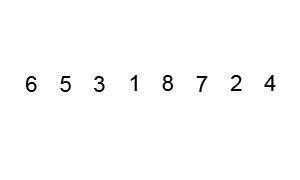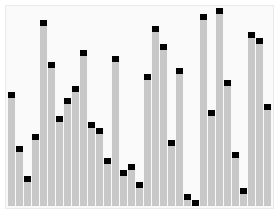Quicksortж— жі•еӨ„зҗҶе°Ҹж•°еӯ—пјҹ
жҲ‘жӯЈеңЁдҪҝз”ЁquicksortеҜ№FFTеҮҪж•°дёӯзҡ„ж•°жҚ®иҝӣиЎҢжҺ’еәҸпјҢеӣ жӯӨжҲ‘еҸҜд»ҘжүҫеҲ°дҪҝз”ЁеӣӣеҲҶдҪҚж•°иҢғеӣҙжқҘжҹҘжүҫејӮеёёеҖјгҖӮзӣ®еүҚпјҢжҲ‘дёҚзЎ®е®ҡдёәд»Җд№ҲйҖҡиҝҮеҝ«йҖҹжҺ’еәҸзҡ„ж•°жҚ®жІЎжңүзңҹжӯЈжҺ’еәҸгҖӮиҝҷжҳҜжҲ‘дҪҝз”Ёзҡ„еҮҪж•°пјҲдҝ®ж”№дёәдҪҝз”ЁеҸҢзІҫеәҰпјүпјҡ
void quickSort(double arr[], int left, int right) {
int i = left, j = right;
int tmp;
double pivot = arr[(left + right) / 2];
/* partition */
while (i <= j) {
while (arr[i] < pivot)
i++;
while (arr[j] > pivot)
j--;
if (i <= j) {
tmp = arr[i];
arr[i] = arr[j];
arr[j] = tmp;
i++;
j--;
}
};
/* recursion */
if (left < j)
quickSort(arr, left, j);
if (i < right)
quickSort(arr, i, right);
}
жҲ‘дёҚзҹҘйҒ“еҰӮдҪ•е°Ҷиҫ“еҮәж”ҫеңЁиҝҷйҮҢпјҢеӣ дёәе®ғеҫҲй•ҝгҖӮд»ҘдёӢжҳҜжүҖжңүжңӘжҺ’еәҸж•°жҚ®зҡ„еӨ–и§Ӯпјҡ
0.01033861 0.00861337 0.00861337 -0.00326733 -0.00326733 0.00098514 0.00098514 -0.01022199 -0.01022199 -0.00303045 -0.00303045 -0.00435644 -0.00435644 -0.00217089 -0.00217089 -0.00171707 -0.00171707 -0.00073572 -0.00073572 -0.00283767 -0.00283767 0.00008432 0.00008432 -0.00288364 -0.00288364 -0.00162750 -0.00162750 -0.00222617 -0.00222617 -0.00017057 -0.00017057 0.00101272 0.00101272 0.00332283 0.00332283 -0.00115711 -0.00115711
жҺ’еәҸдјјд№ҺдёҚжӯЈзЎ®пјҢеӣ дёәеӨ§йғЁеҲҶиҫ“еҮәйғҪеҢ…еҗ«йқһеёёе°Ҹзҡ„ж•°жҚ®пјҲ0.00000000пјүпјҢе…¶дҪҷзҡ„еҢ…еҗ«еҰӮдёӢжүҖзӨәзҡ„дҪҚзҪ®пјҡ
0.00000000 0.00000000 -0.00002053 0.00000000 -0.00002051 -0.00002051 -0.00002050 0.00000000 -0.00002048 0.00000000 -0.00002045 -0.00002039 0.00000000 0.00000000 0.00000000 0.00000000 0.00000000 0.00000000 0.00000000 0.00000000 0.00000000 0.00000000 0.00000000 0.00000000 -0.00002025 0.00000000 -0.00002020 0.00000000 -0.00002019 0.00000000 0.00000000 -0.00002005 0.00000000
иҝҷжҳҜжҲ‘дёәдәҶеҫ—еҲ°иҝҷдёӘиҫ“еҮәжүҖеҒҡзҡ„пјҡ
int size = sizes[i];
int numElements = (int)pow(2.0, ceil(log((double)size)/log(2.0))); //next power of 2
double *X = (double *) malloc((2*numElements+1) * sizeof(double));
double *p = ptr[i]; //ptr[i] is a void *ptr;
//X is filled with data
for (j = 0; j < size; j++){ //put numbers in
if ((double)*(p+j) < 1000 && (double)*(p+j) > -1000) {
X[2*j+1] = (double)*(p+j);
} else{
X[2*j+1] = 0.0;
}
X[2*j+2] = 0.0;
}
for (j = size; j < numElements; j++){ //fill the rest with zeros
X[2*j+1] = 0.0;
X[2*j+1] = 0.0;
}
printf("\nStarting FFT()..."); fflush(stdout);
four1(X, numElements, 1, pData);
for (j = 0; j < numElements; j++){
//first block of data is printed
fprintf(pData->pFile, "%.8f %.8f ", X[2*j+1], X[2*j+1]);
}
//create a copy of the array for storage
double *array = (double *) malloc((maxIndex-minIndex+1) * sizeof(double));
for (j = 0; j < maxIndex-minIndex+1; j++){
array[j] = X[2*(j+minIndex)+1];
}
quickSort(X, 1, 2*(long)size+2); //don't need to sort everything
//print out the output of the quicksort
for (j = 1; j < 2*(long)size+2; j++){
//second block of data is printed
fprintf(pData->pFile2, "%.8f ", X[j]);
}
//use interquartile range
double q1, q3, iqr;
q1 = X[(long)size/2+1]; //size is even
q3 = X[3*(long)size/2+1];
iqr = q3-q1;
printf("q1: %.5f, q3: %.5f, iqr: %.5f", q1, q3, iqr);
//check if any of the elements in array[] are outliers
for (j = 0; j < maxIndex-minIndex+1; j++) {
if (array[j] > 3*(q3+iqr)/2){
printf(" A match!"); fflush(stdout);
break;
}
}
дёәд»Җд№ҲжҺ’еәҸдёҚиғҪжӯЈеёёе·ҘдҪңпјҹ
2 дёӘзӯ”жЎҲ:
зӯ”жЎҲ 0 :(еҫ—еҲҶпјҡ0)
cзҡ„зҙўеј•йҖҡеёёд»Һ0еҲ°n-1пјҢиҝҷе°ұжҳҜдҪ зј–еҶҷquicksortеҮҪж•°зҡ„ж–№ејҸгҖӮз”өиҜқеә”иҜҘжҳҜпјҡ
quickSort(X, 0, 2*(long)size + 1); /* changed the +2 to +1 */
жҲ‘дёҚзЎ®е®ҡеӨ§е°Ҹд»ЈиЎЁд»Җд№ҲжҲ–дёәд»Җд№Ҳд№ҳд»Ҙ2пјҢйҖҡеёёеӨ§е°ҸжҳҜиҰҒжҺ’еәҸзҡ„е…ғзҙ ж•°пјҢеңЁиҝҷз§Қжғ…еҶөдёӢи°ғз”ЁжҳҜпјҡ
quickSort(X, 0, size - 1);
зӯ”жЎҲ 1 :(еҫ—еҲҶпјҡ-2)
е®һйҷ…дёҠжҲ‘еңЁзЁӢеәҸдёӯжүҫдёҚеҲ°зЎ®еҲҮзҡ„й—®йўҳпјҢдҪҶжҳҜеҰӮжһңдҪ жғіи®©дёҖдёӘзЁӢеәҸеҜ№дёҖдёӘе…ғзҙ ж•°з»„жү§иЎҢеҝ«йҖҹжҺ’еәҸпјҢйӮЈе°ұжҳҜе®ғпјҡ
#include<stdio.h>
void quicksort(int [10],int,int);
int main(){
int x[20],size,i;
printf("Enter size of the array: ");
scanf("%d",&size);
printf("Enter %d elements: ",size);
for(i=0;i<size;i++)
scanf("%d",&x[i]);
quicksort(x,0,size-1);
printf("Sorted elements: ");
for(i=0;i<size;i++)
printf(" %d",x[i]);
return 0;
}
void quicksort(int x[10],int first,int last){
int pivot,j,temp,i;
if(first<last){
pivot=first;
i=first;
j=last;
while(i<j){
while(x[i]<=x[pivot]&&i<last)
i++;
while(x[j]>x[pivot])
j--;
if(i<j){
temp=x[i];
x[i]=x[j];
x[j]=temp;
}
}
temp=x[pivot];
x[pivot]=x[j];
x[j]=temp;
quicksort(x,first,j-1);
quicksort(x,j+1,last);
}
}
жӮЁеҸҜд»ҘжҹҘзңӢwiki pageгҖӮ
е®ғе…·жңүжүҖжңүдёҚеҗҢзұ»еһӢзҡ„еҝ«йҖҹжҺ’еәҸзҡ„з®—жі•гҖӮдёәдәҶжӣҙжё…жҷ°пјҢиҜ·еҠЁз”»пјҡ
- йҰ–е…ҲйҖ’еҪ’quicksortзҡ„е°Ҹж–№йқў
- еҰӮдҪ•еңЁjavaдёӯеӨ„зҗҶжһҒе°Ҹзҡ„ж•°еӯ—
- дҪҝSASеӨ„зҗҶйқһеёёе°Ҹзҡ„ж•°еӯ—иҖҢдёҚиҝӣиЎҢиҲҚе…Ҙ
- Quicksortж— жі•еӨ„зҗҶе°Ҹж•°еӯ—пјҹ
- JAGSж— жі•еӨ„зҗҶе°Ҹзҡ„жҢҮж•°еҖјпјҹ
- еҰӮдҪ•еңЁc ++дёӯеӨ„зҗҶйқһеёёе°Ҹзҡ„ж•°еӯ—пјҹ
- PassengerдёҠзҡ„Python Flaskж— жі•еӨ„зҗҶе°‘йҮҸ并еҸ‘иҜ·жұӮ
- Quicksortз®—жі•д»…йҖӮз”ЁдәҺе°Ҹж•°еӯ—зҡ„еҲ—иЎЁгҖӮдёәд»Җд№Ҳпјҹ
- PythonеҰӮдҪ•еӨ„зҗҶйқһеёёе°Ҹзҡ„ж•°еӯ—
- RеҰӮдҪ•еӨ„зҗҶе°Ҹж•°еӯ—пјҹ
- жҲ‘еҶҷдәҶиҝҷж®өд»Јз ҒпјҢдҪҶжҲ‘ж— жі•зҗҶи§ЈжҲ‘зҡ„й”ҷиҜҜ
- жҲ‘ж— жі•д»ҺдёҖдёӘд»Јз Ғе®һдҫӢзҡ„еҲ—иЎЁдёӯеҲ йҷӨ None еҖјпјҢдҪҶжҲ‘еҸҜд»ҘеңЁеҸҰдёҖдёӘе®һдҫӢдёӯгҖӮдёәд»Җд№Ҳе®ғйҖӮз”ЁдәҺдёҖдёӘз»ҶеҲҶеёӮеңәиҖҢдёҚйҖӮз”ЁдәҺеҸҰдёҖдёӘз»ҶеҲҶеёӮеңәпјҹ
- жҳҜеҗҰжңүеҸҜиғҪдҪҝ loadstring дёҚеҸҜиғҪзӯүдәҺжү“еҚ°пјҹеҚўйҳҝ
- javaдёӯзҡ„random.expovariate()
- Appscript йҖҡиҝҮдјҡи®®еңЁ Google ж—ҘеҺҶдёӯеҸ‘йҖҒз”өеӯҗйӮ®д»¶е’ҢеҲӣе»әжҙ»еҠЁ
- дёәд»Җд№ҲжҲ‘зҡ„ Onclick з®ӯеӨҙеҠҹиғҪеңЁ React дёӯдёҚиө·дҪңз”Ёпјҹ
- еңЁжӯӨд»Јз ҒдёӯжҳҜеҗҰжңүдҪҝз”ЁвҖңthisвҖқзҡ„жӣҝд»Јж–№жі•пјҹ
- еңЁ SQL Server е’Ң PostgreSQL дёҠжҹҘиҜўпјҢжҲ‘еҰӮдҪ•д»Һ第дёҖдёӘиЎЁиҺ·еҫ—第дәҢдёӘиЎЁзҡ„еҸҜи§ҶеҢ–
- жҜҸеҚғдёӘж•°еӯ—еҫ—еҲ°
- жӣҙж–°дәҶеҹҺеёӮиҫ№з•Ң KML ж–Ү件зҡ„жқҘжәҗпјҹ

